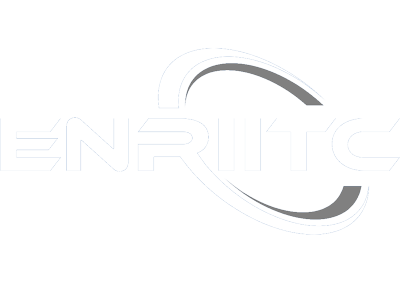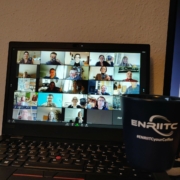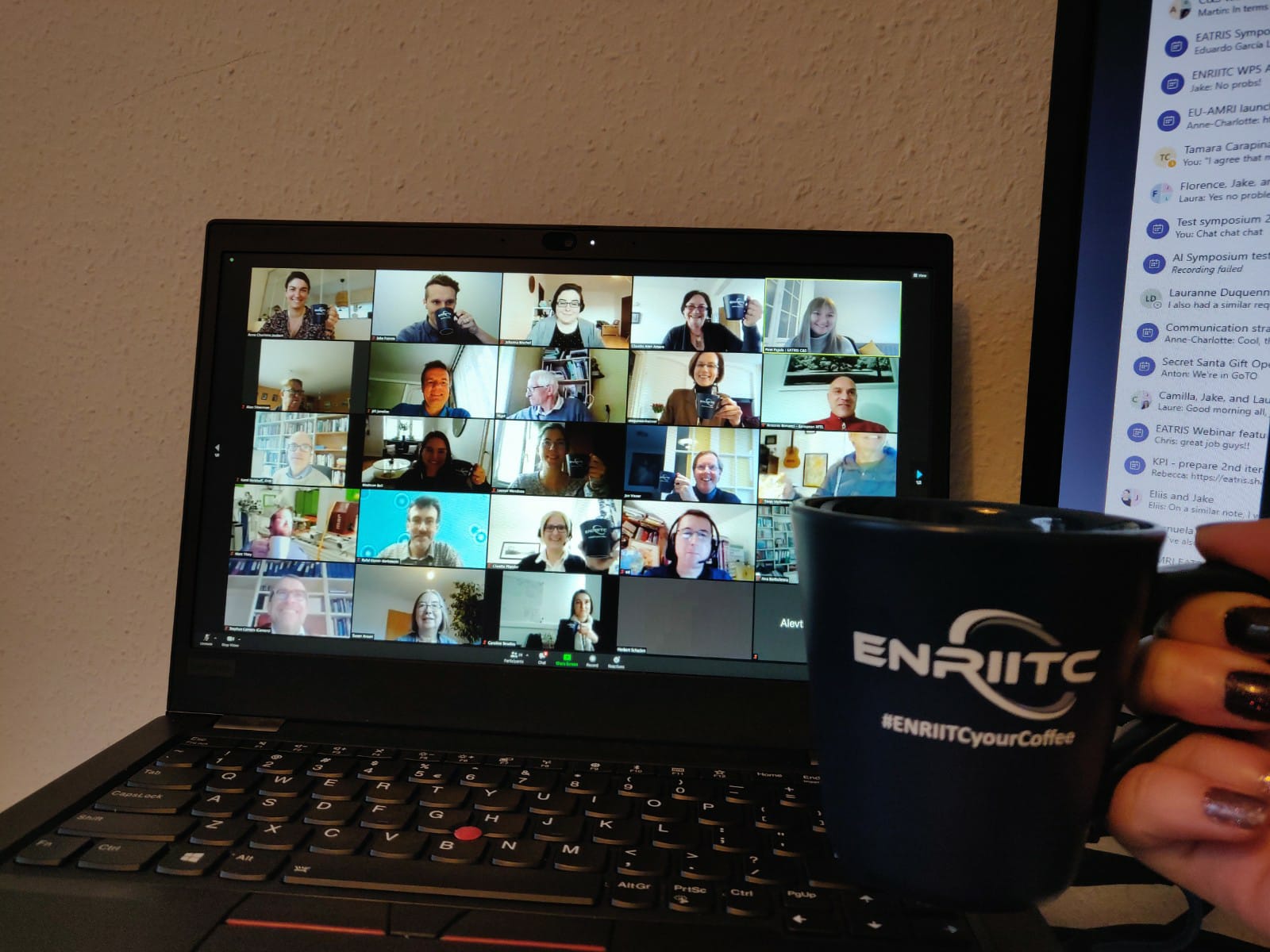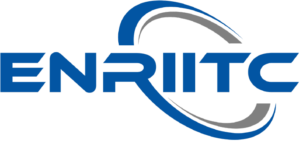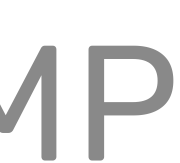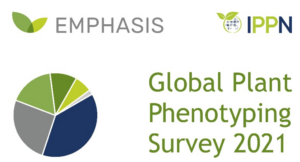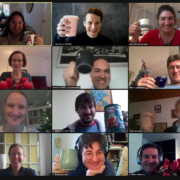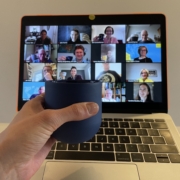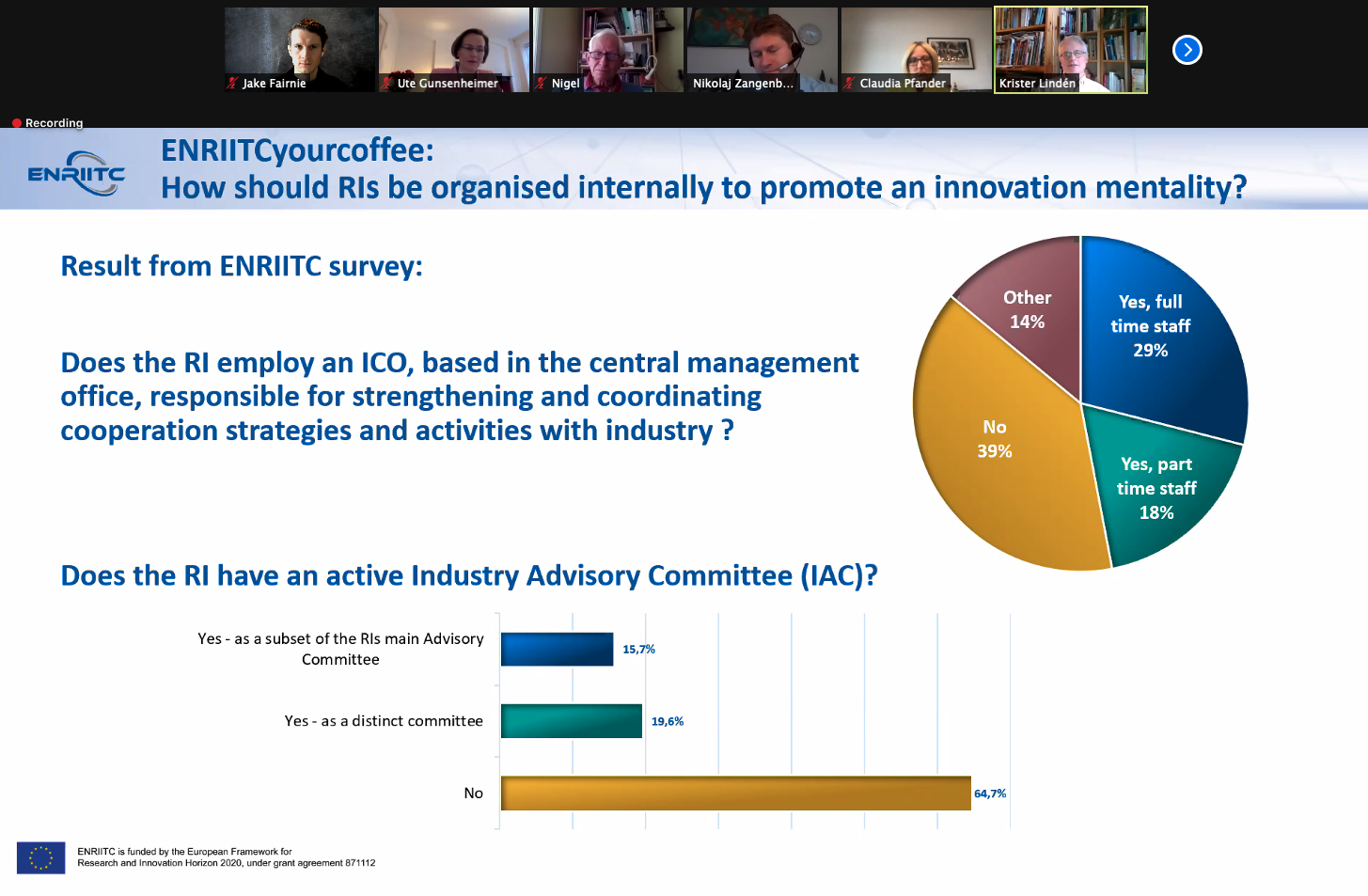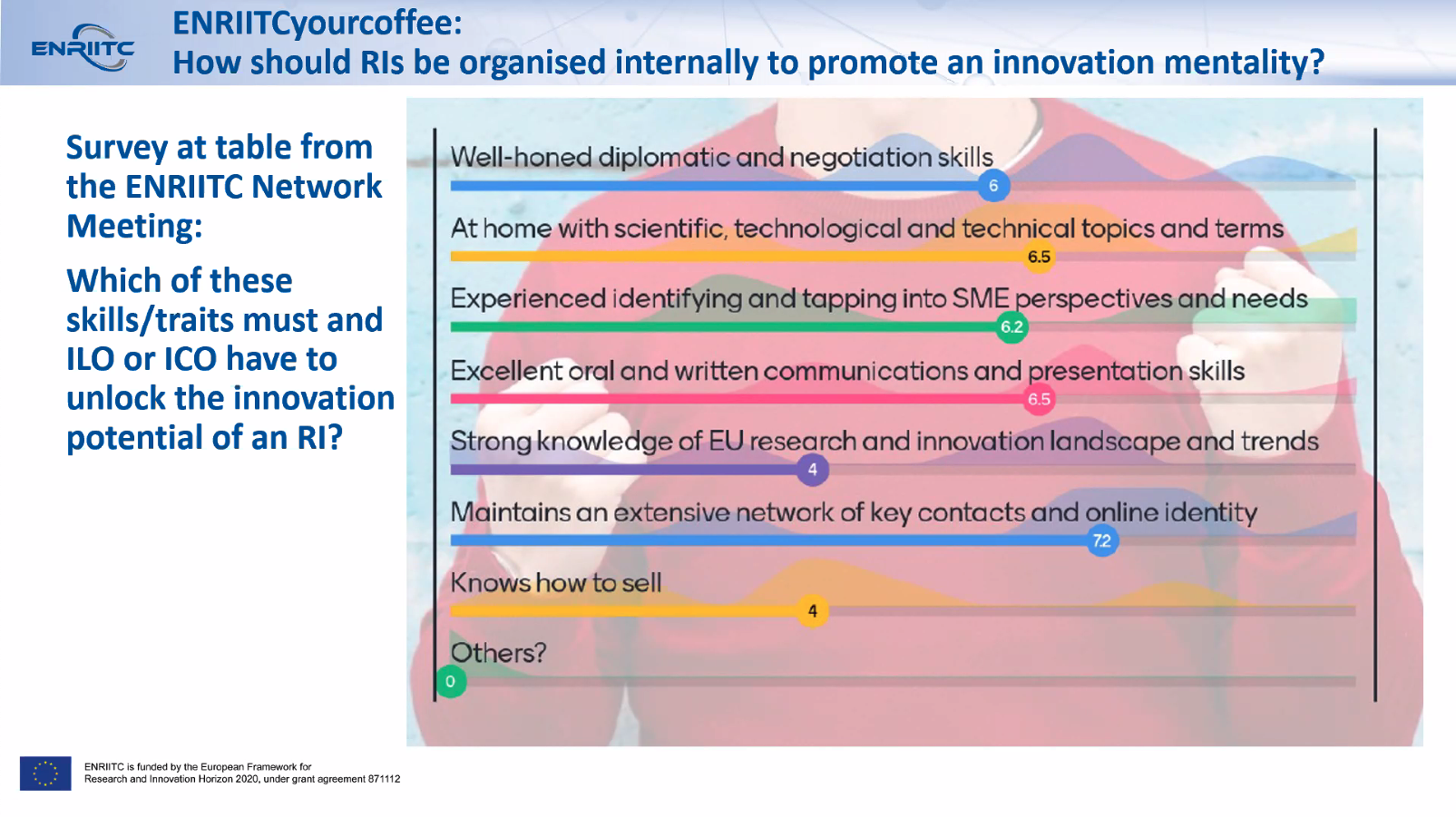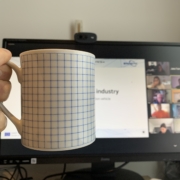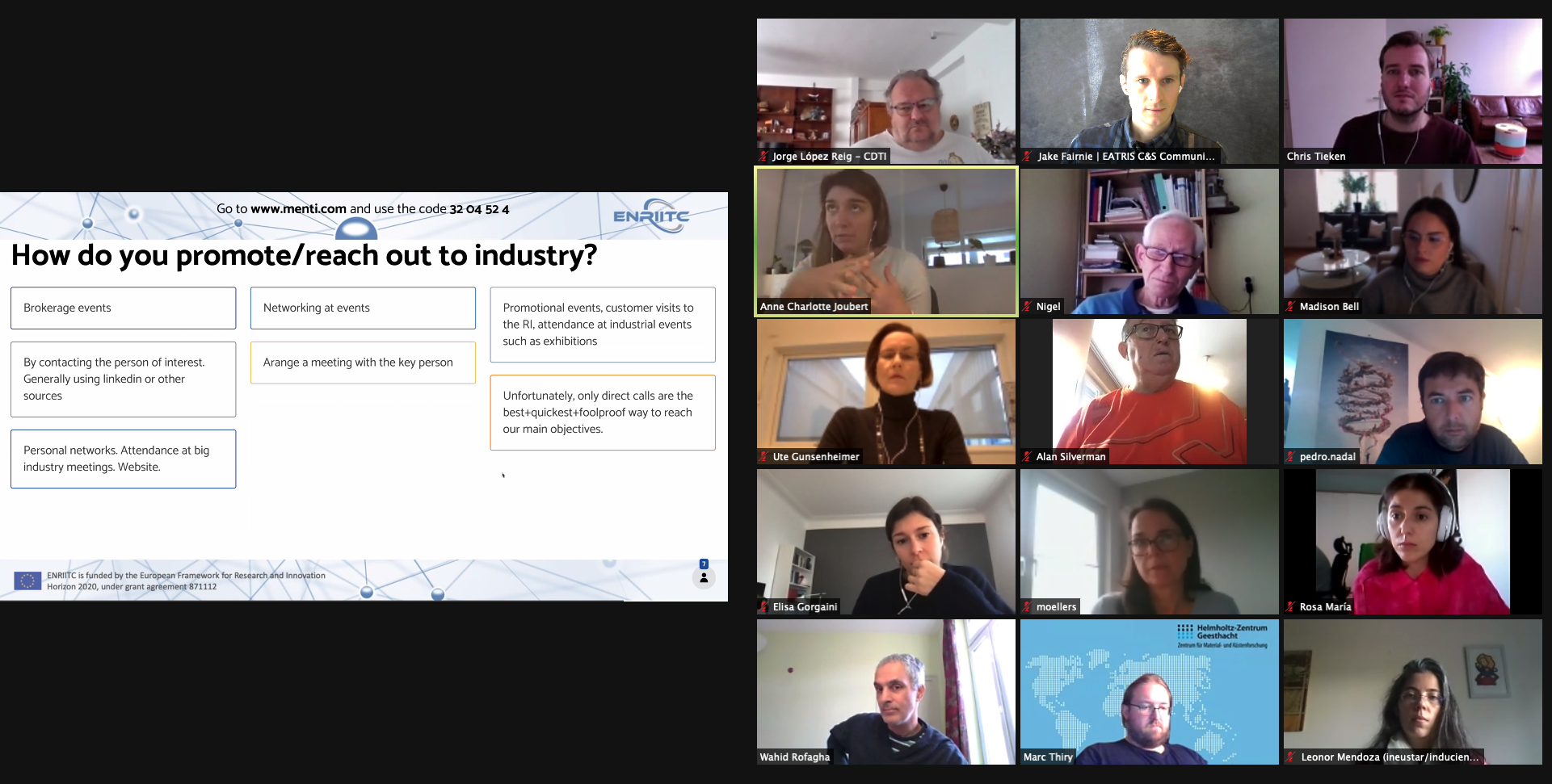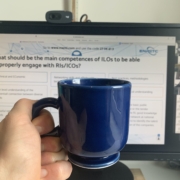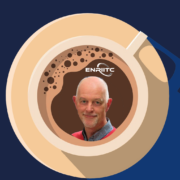#ENRIITCyourCoffee Season 2: Episode 2 – “E-Platforms for Tech/Knowledge Transfer”
We had a fantastic discussion today in the #ENRIITCyourCoffee session led by Ilaria Nardello, Research Associate at the Zoological Station in Naples. The coffee table topic was “E-Platforms for Technology/Knowledge Transfer between Industry & RIs”.
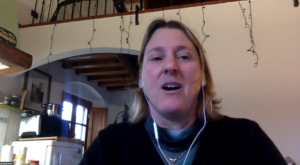
Ilaria opened the session by presenting an overview of knowledge transfer between research infrastructures (RIs) and industry. She outlined a number of possible priorities for specifically-designed portals and e-platforms and talked about how RIs are powerful instruments of communication. Ilaria then ended the introduction by asking the group whether RIs have special powers and how we might be able to build a better or new instrument. What are the priorities for such an instrument in order to work and allow a flow of information and eventually lead to an impact in society and innovation?
At that point, Nigel Wagstaff (EATRIS Advisor Innovation Support) was introduced to share his experience about being at the interface between industry and academia. Nigel then shared his experiences in the CORBEL project. Through a user-led approach CORBEL developed tools, services and data management required by cutting-edge European research projects: collectively RIs established a sustained foundation of and embed the combined infrastructure capabilities into the scientific workflow of advanced users. The project enabled RIs to support users throughout the execution of a scientific project: from planning and grant applications through to the long-term sustainable management and exploitation of research data. By harmonising user access, unifying data management, creating common ethical and legal services, and offering joint innovation. It was a new model for biological and medical research in Europe.
Nigel talked about his experience setting up the innovation help-desk aspect, and dealing with enquiries from both industry and academia. He also talked about resources that were produced for collaboration (e.g. templates and toolkits). The web portal become populated with content that could be downloaded. What became clear was that the innovation help-desk matchmaking seemed to work best through personal networks.
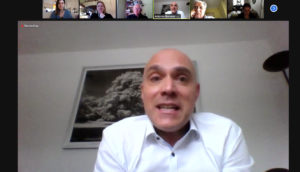
Antonio Bonucci (European XFEL’s Industrial Liaison Officer) then shared his experiences. He started with a brief overview of European XFEL, an international research facility that generates extremely intense X-ray flashes used by researchers from all over the world. He also talked about the ATTRACT project, which is a pioneering initiative bringing together Europe’s fundamental research and industrial communities to lead the next generation of detection and imaging technologies. Antonio also talked about his involvement with the Big Science Business Forum, a business oriented congress which congregates all the European Research Infrastructures, focused on technology and with the aim to be the main meeting point between Research Infrastructures and industry. He mentioned the “BSBF – 3rd Webinar Meeting” that is happening on 18 February 2021, where attendees can hear more about their collaboration platform where anyone can publish on their website about their technology and can look for a possible partnership. He stressed the importance of bilateral collaboration.
Ilaria then picked up on a crucial word that Antonio mentioned: exchange. There was a short discussion around the importance of ‘exchange’, and the vocabulary we use as a community. She then asked if there was anyone from industry present at the session. Ann Ruddy from Redrose Developments stepped forward. She talked about her involvement in developing cutting-edge technologies to harness the benefits of seaweed and provide value-added products to support local economies and communities. In general terms, Ann talked about IP issues and the balance between not giving up everything but also wanting to make sure there is sufficient backing for a project to realise its potential.
There was then a group discussion on the creation and refinement of a portal of information. Does it make sense for RIs to have a catalogue of information?
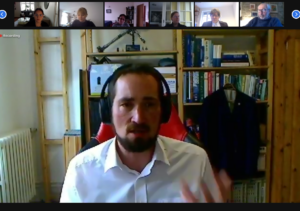 Nicolas Pade (Executive Director of the European Research Infrastructure EMBRC-ERIC) made some interesting comments from his experience working as Europe’s research infrastructure for marine biological resources. EMBRC-ERIC provide access to marine resources, as well as cutting-edge services and facilities that allow researchers, from both academia and industry, to study the ocean and develop innovative solutions to tackle societal issues. He suggested the possibility that distributed RIs are in a position to pick up the smaller projects that larger research institutes may not be interested in pursuing (and may be more interested in more novel and larger projects). However, this obviously needs considerable resourcing.
Nicolas Pade (Executive Director of the European Research Infrastructure EMBRC-ERIC) made some interesting comments from his experience working as Europe’s research infrastructure for marine biological resources. EMBRC-ERIC provide access to marine resources, as well as cutting-edge services and facilities that allow researchers, from both academia and industry, to study the ocean and develop innovative solutions to tackle societal issues. He suggested the possibility that distributed RIs are in a position to pick up the smaller projects that larger research institutes may not be interested in pursuing (and may be more interested in more novel and larger projects). However, this obviously needs considerable resourcing.
Ilaria then pointed out that ENRIITC is starting the conversation with the full spectrum of RIs to exchange best practice, tools and experiences. It was a nice point to wrap up the session.
Next week’s session is on “Joint E-platforms for Procurement from Research Infrastructures” led by Nikolaj Zangenberg, who is the Centre Manager at the Danish Technological Institute and ILO for CERN and XFEL. Looking forward to more coffee discussions then!
Watch the episode below!

